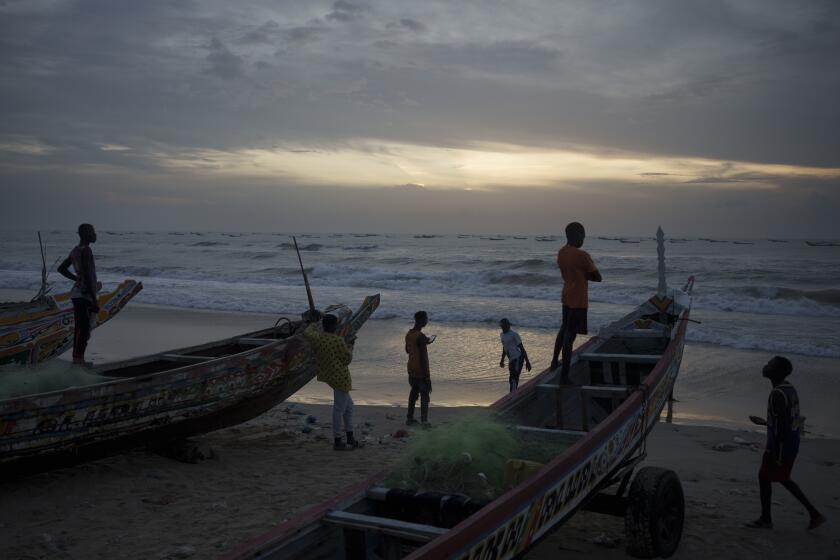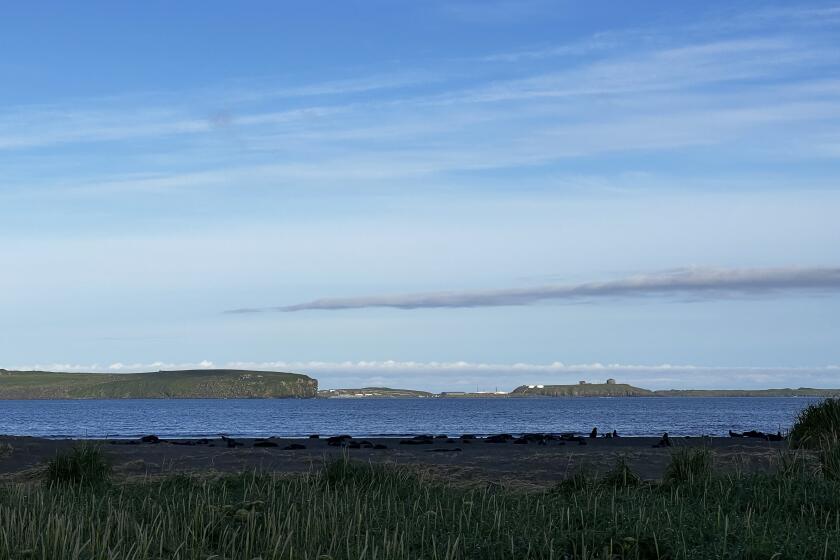U.S. Rejects Nicaragua’s Peace Offer : Labels It a Ploy to Influence Congress on Aid to Rebels
The United States on Sunday formally rejected a new peace offer from Nicaraguan President Daniel Ortega, describing it as a call for the surrender of opposition forces and a last-minute ploy to influence the upcoming vote in Congress on aid to the rebel forces.
The decision to reject the offer was made in a hastily called, two-hour White House meeting attended by Secretary of State George P. Shultz, Defense Secretary Caspar W. Weinberger, CIA Director William J. Casey and White House national security adviser Robert C. McFarlane. Shultz flashed an emphatic thumbs-down sign as he left the White House.
Delivered by Senators
The proposal was delivered to Administration officials by two freshmen Democratic senators, Tom Harkin of Iowa and John Kerry of Massachusetts, upon their return from a trip to Nicaragua. It proffers a cease-fire and restoration of civil liberties in Nicaragua if the United States halts all aid to the rebels--known as contras-- and resumes bilateral talks.
(In Nicaragua, Ortega made no mention of a new Nicaraguan peace proposal in a speech Sunday that was broadcast to the nation by radio.)
Harkin and Kerry said the peace offer was developed during six hours of discussions with Ortega and that it came with some encouragement from them. The two senators strongly urged President Reagan to accept what Kerry described as “a wonderful opening” for peace.
The State Department issued a statement saying that the proposal is nothing more than “a restatement of old positions” by Ortega. It said that in order to achieve peace in Nicaragua, the Sandinista government must initiate a dialogue with rebel leaders--not with the United States.
Cease-Fire ‘Meaningless’
“Without such a dialogue, a cease-fire is meaningless--essentially a call for the opposition to surrender,” the statement said. “The opposition is asked to accept Sandinista consolidation of a Marxist-Leninist order in Nicaragua.”
White House spokesman Robert Sims said the President’s foreign policy advisers were particularly skeptical of the offer because it came just two days before the House and Senate vote on Tuesday on Reagan’s request for $14 million in aid to the contras. “It’s clearly designed to influence the vote here,” he said.
Another Administration official, who declined to be identified, described it as “a phony peace initiative that can be reversed in a heartbeat.” He added: “What we’re seeing is propaganda, disinformation and an attempt by some members of Congress to represent the Sandinistas’ interests.”
Even before the peace offer, it appeared that Reagan’s aid request was headed for certain defeat in the House and probable defeat in the Senate. Efforts to forge a bipartisan compromise in the Senate fell apart Sunday, causing Reagan to cancel a scheduled White House meeting with top Senate leaders. As a result, Senate Democrats are expected to develop their own alternative to Reagan’s aid plan as House Democrats already have done.
But officials acknowledged that Ortega’s offer further complicated the situation. Shultz, Weinberger, Casey and McFarlane met Sunday not only to review the proposal but also to plot strategy to revive the President’s aid request.
According to Sims, Administration officials showed Ortega’s offer to Nicaraguan opposition leaders before formally rejecting it. He noted that Ortega never presented a copy of it to the U.S. Embassy in Managua.
Senate Majority Leader Bob Dole (R-Kan.) urged Reagan to study the offer carefully, even though he said it might only be “warmed over PR (public relations) from Ortega.”
The proposal appeared to be Ortega’s response to an offer made April 4 by the President, who pledged that the United States would supply no military aid to the contras as long as the Sandinistas were involved in productive regional peace negotiations. But Reagan proposed resumption of humanitarian aid to the contras during such talks.
The new Nicaraguan proposal calls upon the United States to discountinue immediately all direct and indirect aid to the contras, restore normal bilateral relations and reinstitute direct U.S.-Nicaraguan talks that would include a team of congressional observers.
In exchange, Ortega offered to call for an immediate cease-fire in Nicaragua, ask the United Nations and the Red Cross to help repatriate refugees, immediately guarantee full freedom of the press and “reaffirm political pluralism and fundamental freedoms.”
He also pledged his commitment to these principles: the nonaligned status of Nicaragua, a treaty promising to keep nuclear weapons out of Central America, nonintervention in other countries, the Contadora Group’s efforts to conclude a peace treaty among the five principal Central American nations, an offer of amnesty for the contras and his intention to respect any Contadora treaty prohibiting military bases in Central America.
The document makes no mention of Soviet and Cuban advisers now in Nicaragua, but Kerry said that the Sandinistas also had “affirmed their willingness to remove foreign advisers.” He said that they also offered to submit to “rigid verification” of the terms of any agreement.
The United States has recently declined to participate in bilateral talks with the Sandinistas until some progress is achieved in the negotiations of the Contadora Group--Mexico, Colombia, Venezuela and Panama. In addition, the United States has asked the Nicaraguan regime to open a “dialogue” with the opposition within its country.
The State Department said that Ortega’s offer contains only two new points--the conditional offer of a cease-fire and the proposal for congressional observers of U.S.-Nicaraguan talks. The department called on the Nicaraguan government instead to respond to the opposition’s peace proposal of March 1 and to initiate direct talks with rebel leaders.
“Talks with the U.S. are not a substitute for the internal dialogue needed to achieve reconciliation among the sectors of Nicaraguan society,” it said.
U.S. officials also noted that Nicaragua’s emergency law restricting civil liberties and press freedom was just extended Saturday until Oct. 20.
In a radio speech Saturday, Reagan charged that Nicaragua has become a stronghold for international terrorism and cited U.S. intelligence reports indicating that at least a dozen Soviet military advisers are operating in the combat zone in northern Nicaragua. Without aid to the contras, he said, the country would soon be a threat to U.S. national security.
More to Read
Sign up for Essential California
The most important California stories and recommendations in your inbox every morning.
You may occasionally receive promotional content from the Los Angeles Times.










